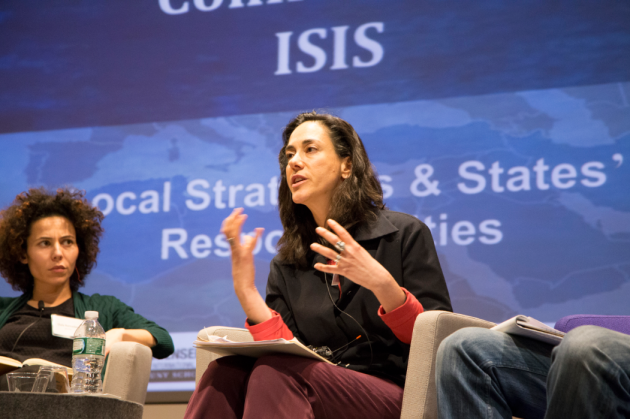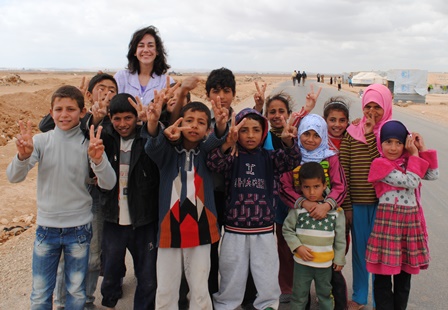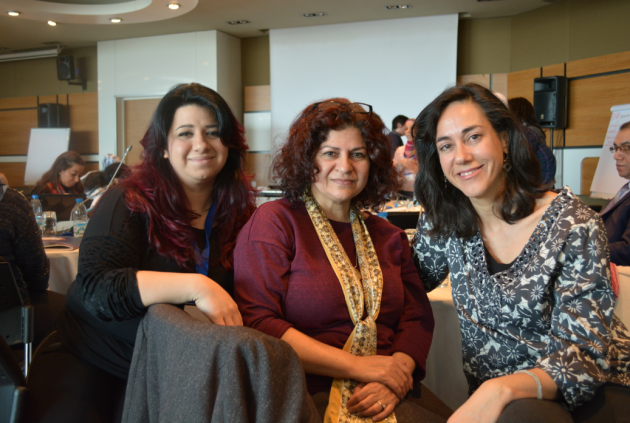
by Eleanor J. Bader
Rape in the Middle East and Women-Led Organizing: Is Social Change on the Horizon for Syrian Refugees?
As desperate refugees continue to stream into Europe in response to the Syrian Civil War and ISIS brutality, it’s easy to become overwhelmed or grief-stricken. But Yifat Susskind, sees a modicum of progressive social change on the horizon for those most affected by the crisis.

© Maureen Drennan
Susskind, Executive Director of MADRE, a 32-year-old women’s human rights organization, is chatting with me in MADRE’s Manhattan office, moving between her personal history as an Israeli-born kibbutznik and the horrors facing women in war-torn areas the world over. Then, she matter-of-factly mentions something shocking. “So many women have been sexually abused by ISIS that it is possible to overturn the social norms that rape survivors in the region often experience,” she goes on. “The idea that rape is the woman’s fault falls apart when it is happening to everyone. As a result, women who have been raped are no longer seen as damaged goods, but are instead being hailed as returning prisoners of war who need to be reintegrated as heroes.”
It’s an amazing turn, but Susskind makes clear that this kind of shift is not anomalous, just little known. What’s more, it is not the only sea change being ignored by mainstream media. Indeed, she reports that there is a great deal of organizing going on in improbable places, much of it women-led.
To Wit: Over its three decade history, MADRE –“mother” in Spanish – has partnered with women’s groups in Colombia, Guatemala, Haiti, Iraq, Kenya, Nicaragua, Palestine and Syria. Their efforts are two-pronged: Raising money for organizations providing hands-on social services and advocating for policies that benefit women, girls and families affected by violence.

© Meena Lenn
In Colombia, this has meant pairing with Taller de Vida, a group that provides art therapy and trauma counseling to former child soldiers. In Guatemala, MADRE has worked with a women’s weaving collective to help preserve a traditional art form and raise money for low-income communities. In Kenya, they’ve joined with the Indigenous Information Network to teach women how to preserve food and collect rain water in areas suffering through drought and severe climate change. And in Iraq they’ve helped support a Women’s Peace Farm for female agricultural workers displaced by war. With the Organization for Women’s Freedom in Iraq [OWFI] they have created an underground railroad for girls and women fleeing ISIS-controlled areas and have raised funds to establish a safe house for them. In the West Bank their work has involved supporting Midwives for Peace to ensure better birth outcomes and improved maternal health in that sorely underserved area.
Since 1983 MADRE has raised about $31 million for these and other projects. Right now, Susskind says, they’re coordinating fundraising for the creation of a rape crisis center and shelter in Kurdistan, to serve women and girls fleeing sexual slavery as well as LGBTQ Iraqis who, she says, “are especially threatened in this super-reactionary climate.” Once the goal of $150,000 is reached–they are hoping for late fall–the center will open its doors. “Many of the women and girls who will use the shelter have nowhere else to go,” Susskind explains. “Their families have been killed and they need immediate medical and psychological help in order to heal.”

© MADRE
Still, while Susskind values direct service, she is pleased that the center will also promote political activism, including support for a campaign to overturn a prohibition on privately run shelters for survivors of domestic abuse. “Right now the Iraqi government does not allow women’s groups to run residences for battered women. Those that disobey are frequently raided by police. If they were allowed to operate openly, the raids would stop,” she says. In addition, under current law, an Iraqi woman needs her husband’s consent to obtain an ID card. Without this document, she is ineligible for food rations and housing. Not surprisingly, MADRE has joined with OWFI and other organizations to push for an end to this policy.
They’re up against mighty foes, both religious and secular, but organizing as women for women is incredibly powerful, Susskind says. “When we mobilize as mothers, it means we’re prioritizing the needs of the most vulnerable people. If we can get governments to focus on these groups, whether in terms of economics, war, or nuclear proliferation, we’ll be a lot closer to what we want to see in the world.”
Susskind herself is the mother of two boys and has been at MADRE since 1997 and executive director of the organization since 2011. “I was born in 1967 on a kibbutz near the Lebanese border,” she tells me. “My paternal grandparents founded the kibbutz in the 1930s and my dad was born in 1948, the year Israel was created. They were the quintessential Jewish family: Ashkenazi, secular and Zionist.”
Her American-born mother’s history stands in stark contrast. Nonetheless, here too Susskind was exposed to political ideas at an early age. She describes her Russian-born maternal grandmother as typical of early 20th-century Jewish immigrants: A socialist, atheist, union supporter who worked in the garment industry.
“My mother’s mother taught me about Jewish ethical practice,” she says. “It was from her that I learned that to be Jewish is to be part of an historical continuum. She taught me to honor the visionary people who came before me, whether they were abolitionist Quakers, pacifist World War I opponents, or Jewish trade unionists.”
In fact, Susskind sees her work at MADRE as ensuring the historical continuity of oppositional politics. “Right after I finished college I went to Jerusalem to organize support for ending the occupation,” she says. This introduced her to joint Israeli-Palestinian human rights groups as well as Women in Black. She did this work for six years and returned to the US in 1997.
Does the work ever get you down? I ask, wondering how she and her co-workers stay sane in the face of so many atrocities. Susskind takes a minute and smiles widely before continuing. “There is great joy in this work because it is fundamentally about making things better,” she says before pausing. “I’m not at all religious but the Jewish teaching that we are in partnership with creation resonates with me. So does a statement attributed to [Mishnah sage] Rabbi Tarfon: ‘It is not incumbent upon you to complete the work, but neither are you at liberty to desist from it.’”
After this brief nod to the Pirkae Avot, Susskind turns to the pile of papers on her desk. “The work will not be finished in my lifetime,” she shrugs, “but I will do as much as I can to promote peace and justice.”